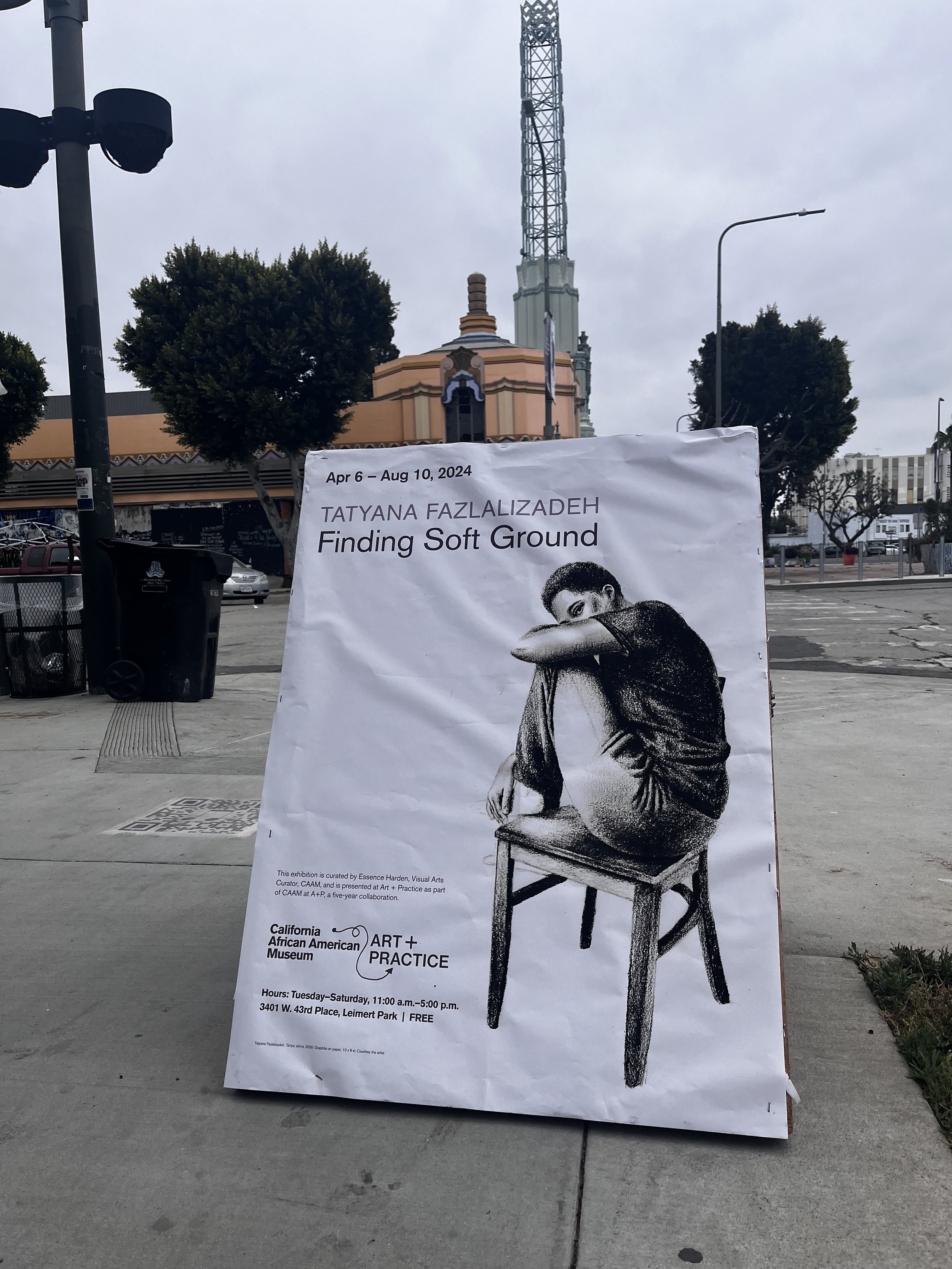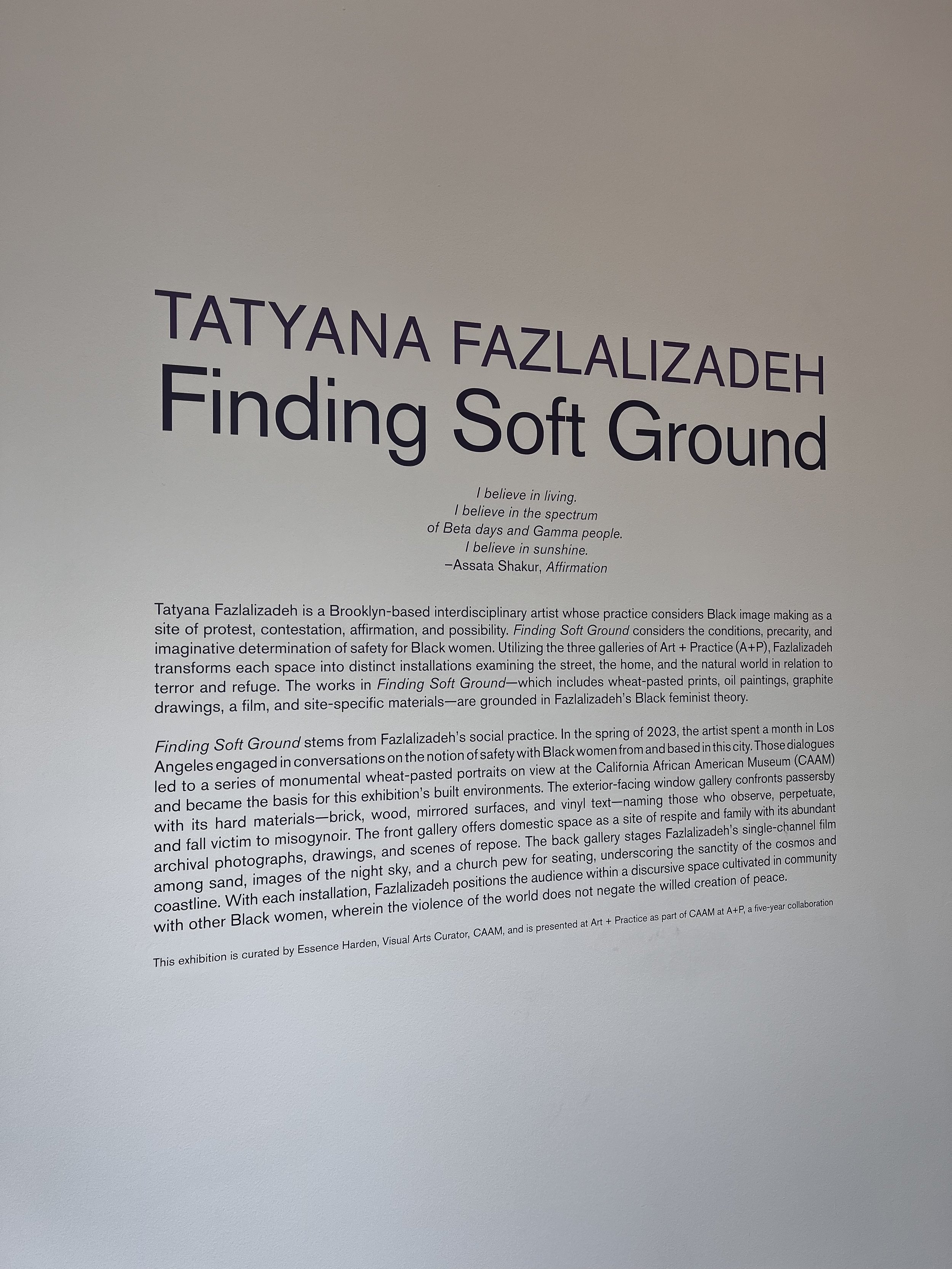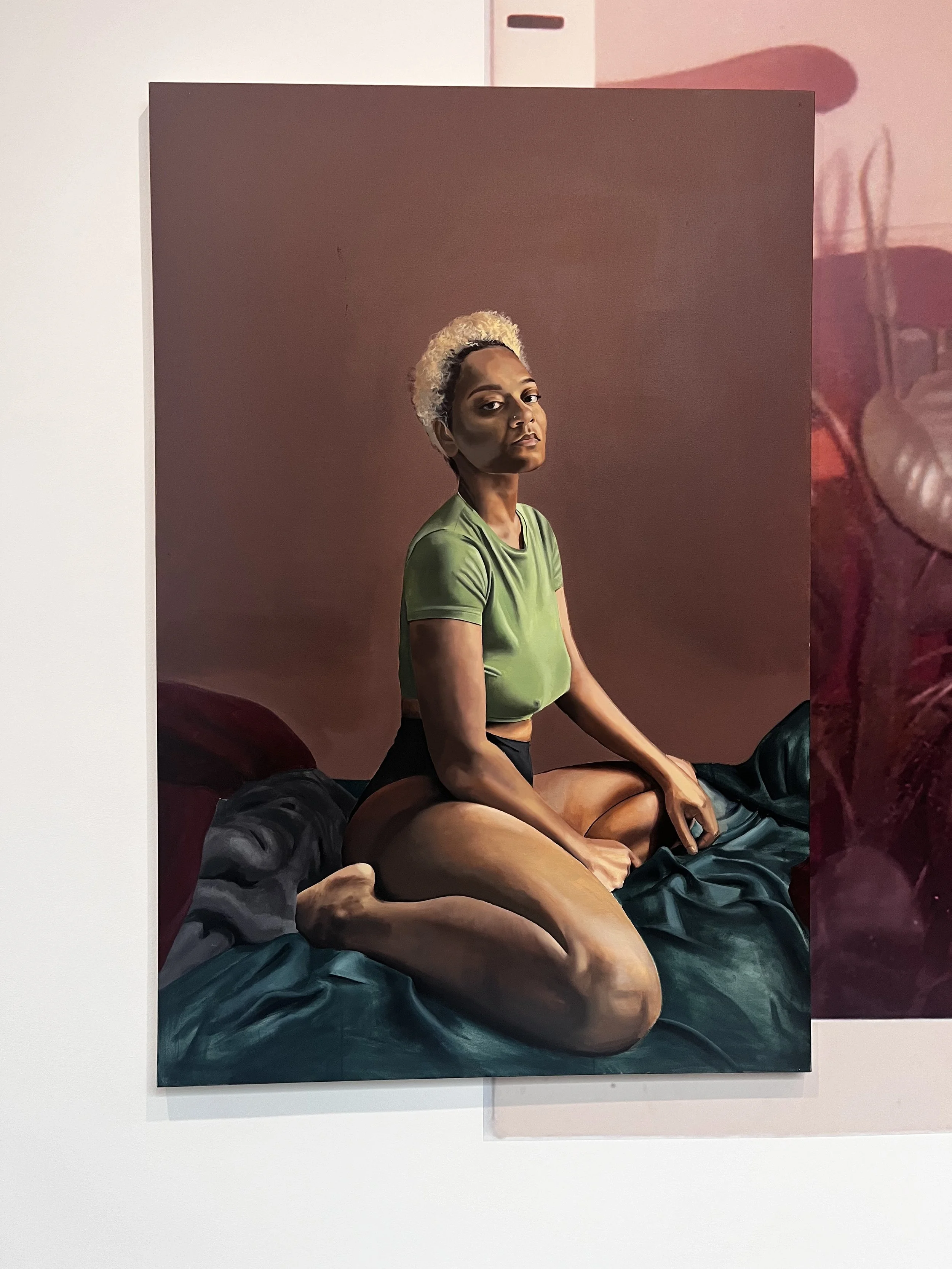Tatyana Fazlalizadeh Reveals How Physical Spaces Harm and Heal Black Women and Femmes
At the beginning of Tatyana Fazlalizadeh’s exhibition "Finding Soft Ground," I noticed a pair of over-ear headphones lying on a pile of concrete blocks. My initial impulse was to pick them up, as I’d done at other art shows. Maybe there was an audio element to the artwork? I thought, scanning the portraits Fazlalizadeh had wheatpasted onto the wood-paneled walls. The posters were from "Stop Telling Women to Smile," her widely acclaimed global series centered on gender-based street harassment, which transformed Fazlalizadeh’s art practice and career. So maybe we listen to interviews of the people in the portraits? That’s when I noticed the headphones’ audio jack, not plugged into anything but dangling by the floor. My gaze drifted to a set of silver keys on another concrete block a few feet away. Suddenly, it clicked: these were weapons.
The headphones help one seem oblivious to whatever street harassment they’re experiencing, while the keys represent the need to be ready to defend oneself, highlighting the constant vigilance and survival tactics that Black women and femmes, who disproportionately face street harassment and violence, often employ.I know this because I’ve done this time and time again while living in major U.S. cities like Los Angeles and New York City, where the Brooklyn-based artist first launched "Stop Telling Women to Smile.” This Aha moment is a testament to Fazlalizadeh’s impactful, evocative practice.
Now on view at Art + Practice in Leimert Park, Los Angeles, “Finding Soft Ground” combines portraiture, text, video, and more to highlight the lives of Black women and femmes in various physical and emotional environments, revealing the abnormality of normalized discomfort, aggression, and terror while spotlighting the critical spaces of care, sanctuary, and ease that often go unrecognized. The themes of love, grief, safety, and unease are woven throughout, presenting a nuanced meditation on where and how we feel secure or vulnerable.
Comprised of three distinct installations, each transforming one of the gallery spaces into a representation of the street, the home, and the natural world, this tripartite structure allows Fazlalizadeh to juxtapose fear with safety, examining how Black femme people navigate and claim spaces of comfort. Her intentional installation art squarely positions viewers within these experiences, one that might seem familiar or foreign and in which you might be complicit or a survivor—or both—depending on how your race and gender allows you to navigate the world. And that’s Fazlalizadeh’s tool of self- and collective-defense—her ability to transform public spaces into powerful, interactive platforms for nuanced Black feminist discourse. “By pointing those things out, you are ultimately pointing out the larger whole,” she said at a recent university lecture.
The stories and voices of Fazlalizadeh’s sitters continue to play a major role in this exhibition as they did in “Stop Telling Women to Smile,” with her conducting numerous interviews with Black femme people from Los Angeles and using these conversations as the foundation for her work. "Speaking To Falling Seeds," a series of monumental portraits of Black Los Angeles women wheat-pasted along the California African American Museum (CAAM) atrium, complements "Finding Soft Ground" and further explores the concept of safety for Black residents in the city. These dialogues, coupled with intimate found photos, Fazlalizadeh’s handwritten notes, and references to news events, like the murder of Breonna Taylor or viral videos of street harassment survivors, infuse the exhibition with a deeply personal and timely resonance.
The home installation within the exhibition provides an intimate look into the private spaces where Black femmes find solace. Through layered, multi-size portrait and figurative paintings and drawings and a thoughtful recreation of an inviting living space—complete with a sofa, lush (living) plants, Black feminism books, tarot cards, and more—Fazlalizadeh captures the restorative vibe of many a Black woman and femme’s haven. Positioned right beside the street harassment environment, this second installation underscores the importance of creating and maintaining safe spaces amidst external pressures and threats and the frailties of physical, protective structures in a world where police murdered a sleeping Taylor in her bedroom.
In illustrating the interplay between nature and the quest for sanctuary, the natural world installation offers a contrasting yet complementary perspective. Fazlalizadeh’s video work in this space evokes a sense of peace and contemplation, inviting viewers to literally touch grass—or, in the case of this exhibition and Los Angeles’ beach landscapes, sand— and consider the ways in which natural environments provide an oasis. This segment is particularly poignant in its reflection on the broader ecological and environmental challenges uniquely faced by Black communities throughout the U.S.
“Why I love Tatyana’s work and working with her as an artist is there is a directness to her project and to her own principles that’s really felt in the work,” said Essence Harden. The Visual Arts Curator at CAAM, Harden organized the exhibition and held a curatorial walkthrough that I attended last May. “[Her work] is deeply dense in terms of concept, but I do think there is more immediacy to her wanting you to feel something and that feeling comes through the effects that she uses throughout the work.”
I also learned during the walkthrough that a line from “Their Eyes Were Watching God,” author and anthropologist Zora Neale Hurston’s magnum opus, inspired the titles of both exhibitions: “‘She often spoke to falling seeds and said, ‘Ah hope you fall on soft ground,’ because she had heard seeds saying that to each other as they passed,’” wrote Hurston, referring to the novel’s famous protagonist Janie Mae Crawford. As a foremother of Black feminist literary studies, Hurston has been a foundational figure in Fazlalizadeh’s work (she included a painting of the author in the show) and, in the case of “Finding Soft Ground” and “Speaking to Falling Seeds,” Hurston and her writings functioned as a conceptual framework, Harden explained.
Overall, this exhibition not only showcases Fazlalizadeh’s artistic prowess and political power, but also her fierce continued commitment to public interventions. Just as a set of keys and headphones serve as symbols of protest and survival, the must-see exhibition "Finding Soft Ground” serves as a shield fortified by recognition, imagination, and care.
"Finding Soft Ground" runs until August 10, 2024, at Art + Practice in Leimert Park, Los Angeles.
Outfit Details
Top: Babaton Sculpt Knit Squareneck Tank, Aritzia
Skirt: Short Pleated Skirt In Gray Wool, The Kooples (I couldn’t find my version. Shout out to my sisters who bought it for me at a Kooples sample sale!)
Boots: Knee Boot in Leather, Theory (also gifted from my sister!)



















